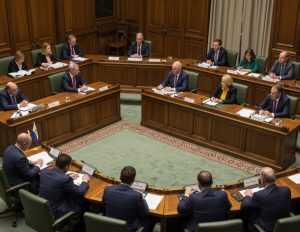Within the large and sometimes complex terrain of politics and administration, the idea of “about” gives a basic starting point for research. It motivates us to probe further than first impressions and fosters a thorough knowledge of the fundamental ideas, systems, and processes influencing our countries. Whether we are looking at the fundamental ideas of a political philosophy, the background of a government institution, or the several effects of a particular policy, the first step toward informed participation and critical study is always “about”. This research will investigate the relevance of this straightforward but important question in the domain of government and politics, looking at its application in many spheres of the field and stressing its relevance for the informed citizen as well as the committed researcher.
The Starting Point of Political Insight

Knowing Ideological Foundations: Our Approach
When we examine political philosophies, the question “about” forces us to explore the fundamental ideas and ideals underlie them rather than rely just on crude labels. Inquiring “What is liberalism about?” for instance calls for a study of its fundamental ideas—individual rights, limited government, and the rule of law. Likewise, asking “What is conservatism about?” calls for knowledge of its focus on personal responsibility, social order, and legacy. By asking this basic question, we go beyond mere classification and get a better respect for the philosophical foundations guiding many political points of view and policy agenda shaping. Engaging in meaningful conversation and appreciating the many ways of governance that exist along the political spectrum depend on this awareness.
Analyzing Institutional Frameworks: What Is This About?
When examining governmental organizations, the “about” issue is also quite important. Inquiring “What is the Supreme Court about?” calls for a study of its constitutional mandate, function in law interpretation, and influence on the legal scene. Likewise, asking “What is Parliament about?” calls for knowledge of its legislative powers, representative character, and interactions with other bodies of government. Asking this question helps us to understand the goals, powers, and constraints of institutions rather than only noting their names and hierarchies. Evaluating the performance of these institutions and lobbying for required governance reforms or changes depend on this better knowledge.
Summary
The apparently straightforward “about” is a great weapon for negotiating the complexity of politics and administration. It forces us to go beyond surface knowledge and probe the fundamental ideas, the functional goal of institutions, and the expected and unexpected effects of actions. Regular inquiring “about” helps us to develop the information and critical thinking abilities required to be informed and involved citizens. This basic act of research helps us to develop a more complex knowledge of the elements influencing our society and enables us to engage more successfully in the continuous conversation defining the field of governance and politics. Basically, “about” is the key to releasing a more deep and meaningful understanding of the surroundings; it is not only a query.
Stay updated on political developments—subscribe to our newsletter.
Bluenc is an organization related to Government and Politics. Our goal is to share Politics and Government related articles that will be helpful to the readers studies.
